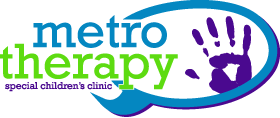Why Your Child’s Speech Therapy May Look Like Play
My name is Sarah and I'm a speech-language pathologist at Metro Therapy in Fridley, Minnesota. Today I'm going to share a little bit about how we use play in our language therapy with young children. Sometimes parents and caregivers are worried that their children aren't working or learning enough because their sessions look like play. But we're not just playing! For children play is not a distraction from learning, play is learning.
Examples of Play Activities Used in Speech and Language Therapy
Kids learn best in context-rich, multisensory experiences. We play interactive games like peekaboo or sing songs using actions to work on things like imitation, engagement, and initiation. When we're playing with toys, our therapists are targeting specific communication goals and using strategies to build language skills.
For example, by playing with a toy farm set, we can target many different communication goals:
We might be working on following directions or understanding concepts like, "I'm going to put the cow in the barn," or, "Oh no, the chicken is up on the roof. Get down."
A child might be learning to ask for help if they need help opening some of the tricky latches on a toy barn door.
We might be working on imitating simple speech sounds or syllable shapes for the animal sounds, like “moo” or “baa.”
We might be working on action words or combining words like, "Go cow," or "Eat hay."
Toys and Games Help Children Build Developmental Skills Outside of Therapy
Another benefit to using toys in therapy is that the skills that we're working on in the session can be carried over at home or at their daycare, if the child has some of the similar toys that we have in the clinic.
As children get older, we may start to use a combination of more structured and play-based activities. However, even for older children, including a game or a fun activity can be motivating and keep the therapy interesting and meaningful.
Call Metro Therapy for an Evaluation
Targeting skills through play builds neural connections, it promotes positive relationships, and it provides meaningful context, which is why we use it so much in our speech sessions. If you have any concerns about your child's speech or language, you can call Metro Therapy at (763) 450-9400.
